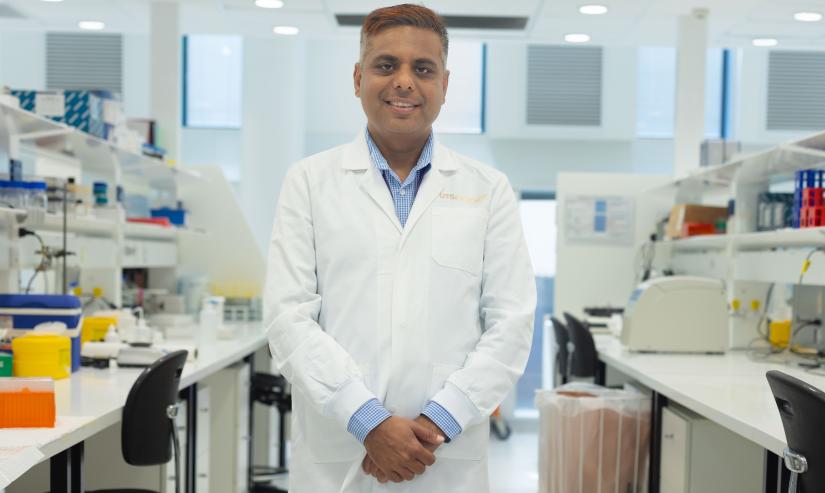Although Sydney is now home, Dr Kamal Dua grew up in India, the birthplace of ‘Ayurveda’, an alternative medicine system that includes the use of herbal medicines.
He says this foundational knowledge system has inspired and influenced both his career choices and research direction.
“Herbal medicine continues to be popular due to its healing properties and minimal side-effects, gaining massive attention around the globe. According to the World Health Organisation, around 80 per cent of the world’s population is estimated to use traditional medicine and I’ve seen the benefits they bring in their current form, usually powder or decoction," he says.
"But I believe with access to advanced knowledge and tools, we can now make them even more effective. I’m working with several high-profile industry partners on a variety of projects using traditional medicinal plants."
"We're using the power of nanotechnology to create novel and advanced drug delivery platforms that, in time, should be able to deliver the medicine exactly where it is needed, at exactly the right dose, at exactly the right time."
Dr Dua is a Senior Lecturer in the Discipline of Pharmacy at the Graduate School of Health and Senior Research Fellow at the Australian Research Centre in Complementary and Integrative Medicine in UTS and an expert in drug delivery, immunology and microbiology.
He says berberine and agarwood are great examples.
“Berberine and agarwood have long been used in traditional Ayurvedic and Chinese medicines. Both have shown therapeutic benefits for diabetes and cardiovascular disease, including suppressing the proliferation of lung cancer cells in the lab, reducing airway inflammation and damage to healthy lung cells exposed to cigarette smoke,” he explains.
Chronic respiratory conditions affect nearly one-third of Australians and, by 2025 it is estimated that, worldwide, there will be an additional 165 million individuals with chronic lung disease. However Dr Dua says the benefits of these traditional medicines, so far, have been limited.
“Berberine and agarwood, for example, are not water soluble and don’t easily get absorbed in the gut. They can also be toxic at very high doses,” he explains.
To overcome these challenges, Dr Dua’s team has developed liquid crystalline nanoparticles, an advanced drug delivery system that encapsulates berberine in tiny soluble and biodegradable polymer that provides an effective and non-invasive drug delivery system directly into the lungs.
“This research highlights multiple advances, including improved knowledge and application in the field of formulation sciences, phytoceutical-based therapeutics, and better management of respiratory diseases, particularly Chronic Obstructive Pulmonary Disease (COPD) and lung cancer,” Dr Dua continues.
The overall aim is to improve peoples’ quality of life by providing targeted, more effective therapies, with reduced side effects.
"Patients may also no longer need to take multiple medications at different intervals, which would likely result in better patient compliance too.”
This research is so exciting that Dr Dua’s team (including Dr Keshav Raj Paudel, Professor Brian Oliver, Professor Phil Hansbro, Professor Kylie Williams, Professor Jon Adams, Dr Bikash Manandhar and Gabriele De Rubis) has attracted multiple academic and industry research partners and more than $150,000 in public and private research funding in just under one year.
Vitex Pharmaceuticals, an industry-leading researcher and manufacturer of solid dose complementary medicines with state-of-the-art $100 million facilities in Western Sydney, is just one of several industry partners to invest in a research partnership.
“Our collaboration with Kam and his team has already significantly benefitted our company,” says Dr Aniss Chami, CEO of Vitex who says they have been working together for just over a year.
“Firstly, Kam is heavily involved in the research of ingredients that we commonly use in our medicines. We have been working together to commercialise those ingredients into high-therapeutic finished products,” Dr Chami continues.
“Kam has also created a cutting-edge training module that is helping up-skill our employees in just two months – much faster than the traditional three-year degree process.”
Dr Chami says the complementary medicine industry is booming and has great potential. He says Kam is helping them stay ahead of the game.
“It’s rare to meet anyone as passionate, innovative or impressive, who has truly dedicated their life to making sure his work improves the quality of life for people,” says Dr Chami. “He is a real pleasure to work with too, a real firecracker!”
Dr Dua says there is unlimited potential for exploring traditional plant medicines, not just from the Ayurvedic tradition, but also Australian bush medicine, used by Indigenous people for millennia, and other traditional medicines from around the world.
“When it comes to developing nutraceutical and functional foods to treat deadly diseases, I believe we are just at the beginning. We are investigating many other compounds including rutin, naringenin, curcumin, celastrol, zerumbone and boswellic acid as well as extending our studies into other health issues, such as influenza,” Dr Dua continues.
“We are very interested in linking with other academic and industry partners to make an even bigger impact, so if you have a research question we might be able to help with, don’t hesitate to contact the team.”
To read more about Dr Dua’s work:
- Plant compound effective against lung cancer in laboratory setting – Medical News Today
- Berberine: the new miracle drug for lung cancer? – TRTWORLD
- Traditional Chinese medicine shows promise in treating lung cancer - SciTechDaily
This impact story was developed as part of UTS' Distilling Research Impact initiative, which is designed to help academics tell the story of how their research is making a difference for their partners and in their communities.


